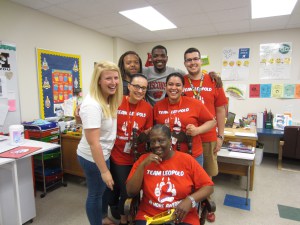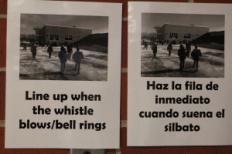






 Leopold Elementary School’s behavior support team includes Linda Johnson (seated); second row: Stephanie Nagel, Lori Gianpaolo, Dulce Contreras; third row: Jeremy Thornton, Vincent Carey, and Thomas Casper. (Contributed photo, Leopold Elementary)This story is part of the Bridging the Gap, a Madison Commons special report on Madison’s racial academic achievement gap. To view the full report, visit achievement.madisoncommons.org.
Leopold Elementary School’s behavior support team includes Linda Johnson (seated); second row: Stephanie Nagel, Lori Gianpaolo, Dulce Contreras; third row: Jeremy Thornton, Vincent Carey, and Thomas Casper. (Contributed photo, Leopold Elementary)This story is part of the Bridging the Gap, a Madison Commons special report on Madison’s racial academic achievement gap. To view the full report, visit achievement.madisoncommons.org.
Children with behavioral problems are not bad kids. More often than not, they just need to be taught how to behave.
Leopold Elementary is teaching behavioral skills to prevent future problems.
“The goal is to be restorative, proactive, and supportive upfront, rather than reactive and punitive at the back-end,” Assistant Principal Mathew Thompson said.
The school has set aside a special room known as the Ranch. All students visit it daily during their 30 minute “What I Need,” or WIN blocks. WIN allows students to work on their own needs. Though some students use this block for enrichment activities, others receive PBS, or positive behavioral support, during this block. Students with very disruptive behavioral issues also visit the Ranch outside of their WIN blocks.
Students’ behaviors play a role in every aspect of their day. The Ranch’s teaching strategies must account for that.
“We assume nothing, and we teach everything,” Thompson said. “How to conduct yourself when transitioning in the hallway, using the bathroom, being in the cafeteria, being in the library, everything. We teach every routine.”
The Ranch staff also keeps data on when and where behavioral problems occur in the school. The areas with the most problems, known as hotspots, get more supervision.
“The data showed that our 5th graders had a spike of behavioral issues during gym time,” said Cross Categorical teacher Stephanie Nagel. “Knowing that hotspot means the Ranch staff can be right there when it happens and prompt the students to remember the skills we taught them. That’s something we’ve never been able to do before.”
“Tito Paws,” named after the school’s mascot, also reinforce positive behaviors. Staff award Tito Paws to students when they show positive behaviors.
“We explicitly teach what we’re rewarding,” Principal Karine Sloan said. “Otherwise students won’t know how to repeat it.”
 A sign in Leopold tells students what to do when the bell rings or whistle blows. (Silke Schmidt/Madison Commons)Examples of positive behaviors fill the school. Posters with the phrase “Be respectful, be responsible, be safe” are a common sight. Similarly, the rules for the playground hang near the door. Hallways and classrooms even hang flowcharts for handling emotions.
A sign in Leopold tells students what to do when the bell rings or whistle blows. (Silke Schmidt/Madison Commons)Examples of positive behaviors fill the school. Posters with the phrase “Be respectful, be responsible, be safe” are a common sight. Similarly, the rules for the playground hang near the door. Hallways and classrooms even hang flowcharts for handling emotions.
If these examples fail to spread the message, the school can use an alternative strategy. PBS assemblies address school wide behavioral problems, such as swearing.
“All of this is founded on the premise that kids should be in class learning,” Thompson said.
Sometimes, disruptive behavior goes beyond the ability of teachers to handle it in the classroom. Because education school focuses almost solely on how to teach curriculum, teachers can be unprepared to deal with the behavioral components of the classrooms they teach.
The Ranch staff will work on this and other remaining problems throughout the school year and continue to make significant changes in the system.
|
|
|
Welcome to the Madison Commons, a website designed to provide news and information about all of Madison's neighborhoods and a crossroads for the discussion of community issues. The name comes from the idea of a village commons, a place for news, talk, debate, and some entertainment, too, that's open to everyone.
All rights reserved. Read more about the Madison Commons and its partners.

